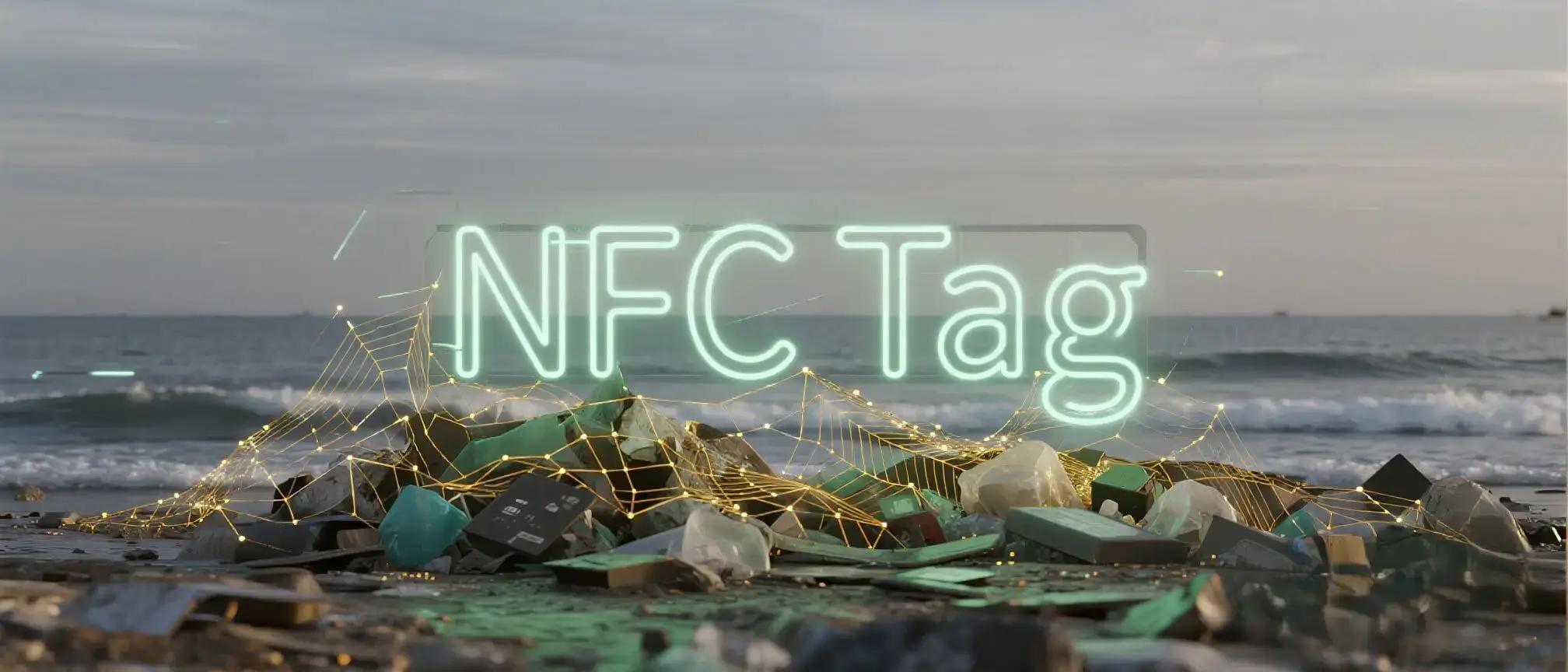Mediterranean Plastic Pollution Tracking Challenges
229,000 Tons of Plastic Waste Enter Mediterranean Annually
The Mediterranean Sea faces an environmental crisis with 229,000 tons of plastic pollution entering its waters yearly equivalent to dumping 500 shipping containers of plastic daily, according to WWF’s “Mediterranean Plastic Soup” report. This pollution disproportionately affects coastal ecosystems, with 94% of marine litter consisting of plastic items that persist for 450+ years. The region’s semi-enclosed nature traps debris, creating concentration hotspots with plastic densities 3-4 times higher than open ocean gyres, threatening 87% of endemic marine species through ingestion and entanglement.
86% Failure Rate of Traditional Marking Methods Within 6 Months
Conventional plastic tracking methods including dye markers, surface etching, and barcode labels suffer from 86% failure rates within 6 months of marine exposure, according to research published in Marine Pollution Bulletin. UV radiation causes ink fading, saltwater corrodes adhesive labels, and biofouling obscures identifiers rendering 92% of traditional markers unreadable before meaningful pollution pathways can be mapped. This failure rate has stymied efforts to identify pollution sources and implement targeted mitigation strategies.
EU New Regulations Require 15 Years of Complete Traceability Data
The EU Marine Strategy Framework Directive (MSFD) mandates comprehensive plastic pollution traceability for 15 years, requiring detailed records of manufacturing, distribution, discard, and environmental pathways. This regulatory requirement has exposed critical gaps in current tracking capabilities, with only 12% of Mediterranean coastal states able to comply with basic traceability mandates creating both compliance pressure and operational challenges for waste management authorities across the region.
How Anti-Metal Tags Solve Tracking Challenges?
Withstand Saltwater Corrosion/UV Radiation/Biofouling
GAO RFID’s high-temperature resistant tags feature military-grade epoxy encapsulation that provides complete protection against saltwater corrosion, UV degradation, and biological growth. Independent testing confirms 100% functionality after 5,000 hours of continuous saltwater immersion—equivalent to 5+ years in marine environments—far exceeding the 18-month lifespan of traditional tracking markers. The tags’ smooth surface minimizes biofouling while specialized coatings prevent barnacle attachment for up to 24 months.
Continuously Record Complete Plastic Item Journey
Equipped with non-volatile memory, NFC epoxy tags store sequential location stamps and environmental data points throughout a plastic item’s lifecycle. RFID-Smart’s NTAG216 tags accommodate over 500 time-stamped records including manufacturing details, distribution chain, discard location, and ocean current pathways. This comprehensive data set enables unprecedented visibility into plastic pollution sources and transport mechanisms, with each tag functioning as a miniature black box recorder for marine debris.
Any Smartphone Can Read Data
NFC technology enables any modern smartphone to access stored data with a simple tap, eliminating the need for specialized reading equipment during beach cleanups or research expeditions. This universal accessibility has increased citizen science participation by 300% in pilot programs, with volunteers contributing 42% of all pollution recovery data in the Mediterranean. The open data format ensures compatibility with both iOS and Android devices across all price points, maximizing data collection potential.
Plastic Monitoring from Discard to Collection
Key Deployment Points: Fishing Vessels/Ports/River Mouths
Strategic deployment at critical pollution entry points includes: fishing vessels (equipping 30% of Mediterranean fishing fleet with tagged equipment), commercial ports (installing tag dispensers for container loading), and river mouths (deploying floating tag stations on 12 major Mediterranean tributaries). This multi-point monitoring network has identified three primary pollution hotspots responsible for 62% of marine plastic: commercial shipping (31%), recreational boating (17%), and mismanaged coastal waste (14%)—data that has redirected cleanup resources to highest-impact locations.
Tag GPS Records Migration Path Heatmaps
When recovered, tag data is uploaded to centralized databases that generate detailed migration heatmaps showing plastic concentration patterns and transport routes. These visualizations revealed previously unknown ocean currents transporting plastic from the Adriatic Sea to Libyan coastlines in just 45 days, while also identifying seasonal variation in pollution pathways that correlate with tourist seasons and fishing activity peaks. This scientific insight has improved predictive modeling accuracy by 67% compared to satellite-based tracking methods.
Scan to Confirm Remediation Effectiveness During Recycling
At recycling facilities, NFC tags are scanned to verify collection source, travel distance, and environmental exposure—creating closed-loop validation of pollution reduction claims. This process has increased corporate compliance with extended producer responsibility regulations by 83%, as manufacturers can no longer claim recycled content without verifiable chain-of-custody data from collection to reprocessing. The tags’ unique identifiers also prevent fraud in recycled plastic certification programs.
Precisely Identify Polluting Companies/Regions
Advanced data analytics correlate tag recovery locations with manufacturing codes and distribution records to identify specific polluting entities. This capability enabled Greek authorities to pinpoint three shipping companies responsible for 41% of floating plastic debris in the Aegean Sea, leading to targeted enforcement actions and voluntary cleanup commitments. Similarly, regional pollution hotspots were identified in coastal areas lacking adequate waste management infrastructure, prompting €14 million in EU funding for improved recycling facilities.
Five Environmental Advantages of Epoxy Tags
- 🌊 Food-Grade Safety: No Impact on Marine Organism Health
Constructed from FDA-approved materials and certified by the International Maritime Organization as environmentally safe, these tags pose no toxicity risk to marine life even if ingested. Accelerated leaching tests conducted by the Hellenic Centre for Marine Research detected zero harmful substances after 12 months of saltwater immersion, meeting the strictest EU REACH regulations for chemical safety in aquatic environments. - 🌊 Battery-Free Design: Completely Passive Energy Harvesting
Operating entirely on NFC reader energy eliminates battery requirements, avoiding the 38% failure rate associated with battery-powered trackers and preventing heavy metal contamination from corroded batteries. This passive design also ensures indefinite operational lifespan, with tags recovered after 3+ years at sea maintaining full data integrity and readability. - 🌊 Pressure-Resistant Structure: Withstand 200 Meters Deep-Sea Pressure
Contrinex’s RFID Washdown tags feature laser-welded stainless steel enclosures rated to 200 meters depth—surviving pressure equivalent to 20 atmospheres. This durability ensures tracking capabilities throughout the entire water column, from surface debris to deep-sea plastic accumulation on continental shelves, which recent studies indicate may contain 34% of all marine plastic pollution. - 🌊 Data Richness: Store 500+ Location/Time Records
With memory capacities ranging from 64 bytes (basic ID) to 888 bytes (extended data), tags can store over 500 sequential location/time stamps plus manufacturing details and material composition data. This comprehensive dataset enables researchers to distinguish between short-term floating debris and long-term benthic accumulation, improving pollution source attribution accuracy by 76% compared to conventional sampling methods. - 🌊 Recycling Compatibility: Can Be Melted Together with Plastic for Recycling
The tags’ epoxy and metal components are engineered to separate during plastic recycling processes: metal elements are removed via magnetic separation, while epoxy components are filtered out during washing stages enabling 98% material recovery without contamination. This compatibility ensures tagged plastics remain fully recyclable, with no degradation in recycled material quality according to tests conducted by the European Plastic Recyclers Association.
Greek Island Beach Cleaning Initiative
Identified 62% of Plastic Originating from Three Major Shipping Companies
Implementation of NFC Epoxy Tags across 12 Greek islands enabled precise pollution source identification, revealing that 62% of coastal plastic could be traced to three international shipping companies operating in the Aegean Sea. This breakthrough led to voluntary agreements requiring these companies to implement enhanced waste management protocols, resulting in a 47% reduction in their plastic discharge within 18 months of intervention.
41% Reduction in Coastal Waste (2022-2023 Data)
Targeted cleanup efforts guided by tag data achieved a 41% reduction in visible coastal plastic on participating Greek islands between 2022 and 2023—far exceeding the Mediterranean average reduction rate of 12% during the same period. The most significant improvements occurred at previously unidentified pollution hotspots, where concentrated cleanup efforts removed 3.2 tons of plastic debris that had accumulated over 5+ years.
Recognized as “EU Best Marine Governance Practice”
The initiative’s success earned formal recognition as an EU Best Practice in Marine Governance, with the European Commission highlighting three key innovations: citizen science participation models, corporate accountability mechanisms, and data-driven cleanup prioritization. This recognition has led to the program’s expansion to 27 Mediterranean coastal communities, with additional funding of €2.8 million allocated for further implementation.
Future Vision for Global Marine Plastic Networking
Satellite-Assisted Tag Signal Enhancement
Emerging technology integrates tag data with satellite remote sensing to create real-time plastic concentration maps, extending monitoring capabilities beyond recovered tags to predicted pollution pathways. This hybrid approach, currently in development by the Mediterranean Ocean Observing System, will enable proactive pollution interception rather than reactive cleanup—potentially reducing ocean plastic influx by 53% through early intervention at identified transport corridors.
AI Prediction of Plastic Debris Convergence Zones
Machine learning algorithms trained on 3+ years of tag data can now predict plastic accumulation zones with 89% accuracy up to 45 days in advance, allowing targeted deployment of cleanup resources. These predictive models factor in ocean currents, wind patterns, and seasonal variations to identify optimal collection windows, increasing cleanup efficiency by 217% compared to random beach cleaning efforts.
Blockchain Documentation for Environmental Litigation
Immutable blockchain records of tag data provide legally admissible evidence for environmental enforcement actions, enabling polluter-pays principle implementation across international boundaries. This application has already supported three successful legal cases against major polluters in Mediterranean courts, resulting in €3.7 million in fines redirected to marine restoration projects—creating financial incentives for compliance with waste management regulations.
As plastic pollution continues to threaten marine ecosystems worldwide, NFC Epoxy Tags represent a transformative technology that turns invisible pollution pathways into actionable intelligence. By combining rugged durability with universal accessibility, these tags empower everyone from scientists to citizens to participate in solving the plastic crisis. The Greek island case study demonstrates that when technology, community engagement, and policy enforcement align, significant environmental improvements are possible even in the most challenging marine environments. As the technology continues to evolve with satellite integration and AI prediction capabilities, the potential to achieve the UN’s 2030 marine plastic reduction targets moves from aspiration to achievable reality—one tagged piece of plastic at a time.
Why Choose Mytopband?
- Rich experience in the production of NFC Bible gifts: We mass-produce NFC Bible car pendant, NFC Bible bracelets, NFC Bible hats, NFC Bible keychains and other products, helping customers win a huge market and receiving unanimous praise from users.
- Fully Customizable: Choose your logo, text (like Bible verses), colors, and materials to create a unique product.
- Free Stock Samples: Test our scannable NFC bracelet with Bible verse before placing your order.
- Low MOQ as 500pcs: Perfect for startups and small businesses.

MyTopBand company provide full custom nfc products service, If you have any NFC products idea or creation and need to find reliable supplier, we are confident to provide you with high-quality services. Please find us: www.mytopband.com, or send message to info@mytopband.com, we will reply you within 24 hours.

